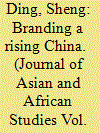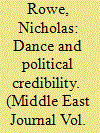|
|
|
Sort Order |
|
|
|
Items / Page
|
|
|
|
|
|
|
| Srl | Item |
| 1 |
ID:
106375


|
|
|
|
|
| Publication |
2011.
|
| Summary/Abstract |
National image is not only a channel to wield a state's national power, but also an important national power resource. It has become critically important for China as it tries to rise in a relatively favorable international environment. Following a theoretical discussion on national image management in international relations and a historical review of China's national image management, this article examines China's strengths and weaknesses in its national image management. On the one hand, China's national image benefits from its strong commitment to cultural diplomacy, effective employment of information and communication technologies in international broadcasting, and close connections with the Chinese diaspora around the world. On the other hand, China's national image management is constrained by such hurdles as weak political credibility, reviving popular nationalism, and various missteps in its foreign policies. This study concludes that China's national image management will remain an uphill battle in the long run.
|
|
|
|
|
|
|
|
|
|
|
|
|
|
|
|
| 2 |
ID:
110335


|
|
|
|
|
| Publication |
2011.
|
| Summary/Abstract |
This article examines how the rural folkdance dabkeh has, in the last century, been appropriated and reinvented as a tradition in order to construct the imagined communities of Zionism, pan-Arabism, and Palestinian Nationalism within Palestine/Israel. This appropriation has led to extensive debates and suppositions on the source, meanings, and cultural ownership of dabkeh. The following historical narratives, emerging from interviews with dance practitioners and dance advocates in the West Bank, Israel, and Lebanon, and from literature in libraries and archives in the West Bank, Israel, and Great Britain, draw attention to the salient links between dance and politics and the multiple ways in which collective identities can be constructed and deconstructed. These histories further raise questions about how local cultural autonomy and sustainability within the Occupied Palestinian Territories have been affected by the process of political appropriation.
|
|
|
|
|
|
|
|
|
|
|
|
|
|
|
|
|
|
|
|
|